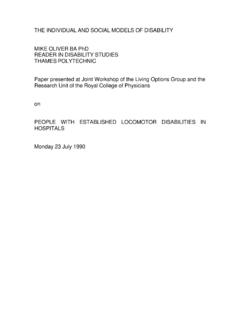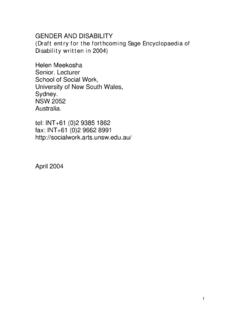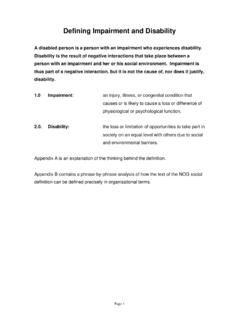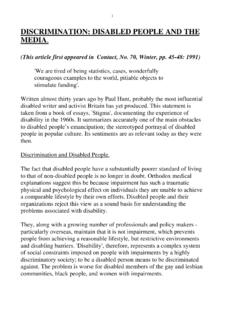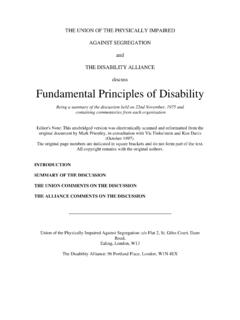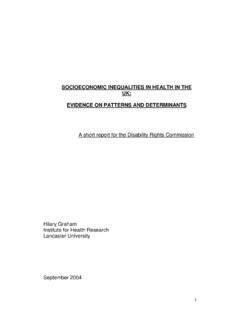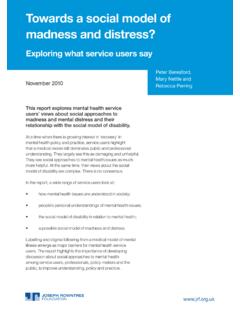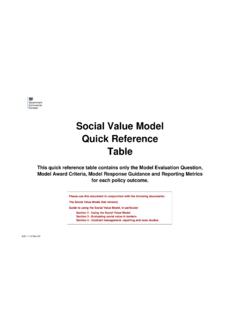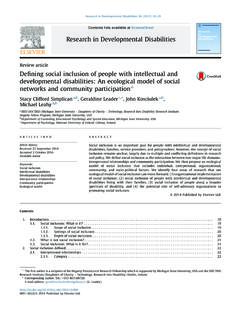Transcription of disability a sociological phenomenon
1 disability : A sociological phenomenon Ignored by Sociologists Colin Barnes and Mike Oliver June 1993. Colin Barnes is lecturer in disability Studies in the Department of social Policy and Sociology at the University of Leeds Mike Oliver is Professor of disability Studies at the University of Greenwich disability : A sociological phenomenon Ignored by Sociologists. Abstract. This paper demonstrates that hitherto sociological analyses of disability have been theoretically and methodologically inadequate. The main reason for this is that sociology, in common with the other major contemporary disciplines. has accepted almost without question the legitimacy of the individualistic. biomedical approach to disability . It is argued that this partial and essentially 'non-disabled' reading of the phenomenon has succeeded in precluding a meaningful evaluation of the economic, political and cultural forces which created and continue to create disability in modern society.
2 Thus. the discipline as a whole has contributed significantly to the continued marginalisation of the disabled population. Moreover, by focusing on the development of the international disabled people's movement and the work of disabled writers it is suggested that disability is an issue as central to mainstream sociological discourse and analysis as class, gender. race and sexuality. Introduction. Recently, a number of sociologists working in the general area of medical sociology and chronic illness have expressed concern over the growing importance of the ' social oppression theory' of disability , associated research methodologies, and their implications for doing research in the 'chronic illness and disability fields' (Bury, 1992). Whilst these writers feel the need to 'positively debate' these developments the basis of their concern is similar to that expressed by Hammersley with respect to some aspects of feminist research, the tendency to 'privilege experience over sociological research methodology' (Hammersley, 1992).
3 In short, it is perceived as a threat, firstly, to 'non-disabled' researchers doing disability research, secondly, to the traditional role of the sociologist giving 'voice to the voiceless' -in this case 'older' disabled people whose interests are said to be poorly served by ' social oppression theory', and, thirdly, to the 'independence' of sociological activities within the 'medical sociology world'. In this paper it will be argued that in the general area of disability research 'experience' should take precedence over ' sociological ' research methodologies, simply because hitherto 'non-disabled' researchers have consistently failed to address the question of disability as perceived by disabled people whether young or old. It will also be proposed that within the context of medical sociology, sociological 'independence' has been conspicuous by its absence due to medical sociologists almost slavish adherence to the traditional individualistic medical view of disability or 'personal tragedy theory' (Oliver, 1986; 1990).
4 Finally, it will be shown that disability can no longer be considered solely as a medical problem affecting only a minority of the population but must be perceived as a civil rights issue as central to mainstream sociological discourse and analysis as class, gender, race and sexuality. sociological Accounts of disability Functionalist Accounts Almost without exception the overwhelming bulk of sociological writing on disability is rooted in the work of Parsons and his analysis of sickness related behaviour. This is because the Parsonian paradigm has been principally responsible for two distinct, but interdependent, approaches which have implicitly or explicitly influenced all subsequent analyses. They are the relevance of the 'sick role' in relation to disability and its association with social deviance, and the notion of health as adaptation (Bury 1982). Briefly, Parsons' model suggests that at the onset of illness 'sick' people should adopt the sick role.
5 Rooted in the assumption that illness and disease impede both physiological and psychological abilities, 'sick' individuals are automatically relieved of all normal expectations and responsibilities. Generally considered unaccountable for their condition they are not expected to recover through their own volition. They are encouraged to view their present situation as 'abhorrent and undesirable', and, in order to regain their former status, are expected to seek help from professional medical experts (Parsons, 1951). Parsons' model assumes that regardless of the nature of the condition or the socio/economic factors involved everyone will behave in exactly the same way. It pays little heed to subjective interpretation and articulates only the views of the representatives of society credited with the responsibility for recovery, the medical profession. It does not accommodate the sick role variation (Twaddle, 1969) nor the distinction between illness and impairment (Gordon, 1966; Sieglar and Osmond 1974).
6 Occupation of the sick role is intended to be temporary. But the same assumptions are applied to people with impairments. The 'impaired role', for example, is ascribed to an individual whose condition is unlikely to change and who is unable or unwilling to meet the first prerequisite of the sick role - to 'get well' as quickly as possible. Occupants of this construct are said to have abandoned the idea of recovery altogether and accepted dependency. Signifying a loss of 'full human status' the impaired role does 'not require the exertions of co-operating with medical treatment and trying to regain one's health, but the price for this is a kind of second class citizenship' (Sieglar and Osmond, 1974, p. 116). A further variation on this train of thought is the 'rehabilitation role' as articulated by Safilios-Rothschild (1970). This model suggests that once a person with an impairment becomes aware of their condition they must accept it and learn how to live with it.
7 This is achieved, it is argued, through the maximisation of existing abilities. Within this frame of reference individuals with impairments are obligated to assume as many 'normal' functions as quickly as possible. They are not exempt from social expectations or responsibilities but must adapt accordingly. Additionally, they should co-operate with professionals and innovate and ameliorate new methods of rehabilitation. Clearly, the locus of responsibility rests squarely on the shoulders of the person with an impairment. They are dependent upon the rehabilitation professionals for at least two specific functions, first, the initiation of rehabilitation programmes designed to return individuals with impairments to 'normality', and, second, assistance in the psychological accommodation of a 'disabled' identity. The process of cognitive adjustment to impairment is usually presented as a series of psychological stages such as 'shock', 'denial', 'anger' and 'depression'.
8 Movement is sequential and generally seen as only one way. Passage through each stage is determined by an acceptable time frame according to professionally agreed criteria (Albrecht, 1976). Apart from the fact that there is substantial evidence questioning the empirical validity of these theories (Silver and Wortman, 1980) they can be criticised on at least three different levels. First, they are essentially determinist; behaviour is only viewed positively if it is commensurate with professionals' perceptions of reality. Second, they ignore extraneous economic, political and social factors. Third, they undermine and deny subjective interpretations of impairment from the perspective of the person concerned. In sum, they are the product of the 'psychological imagination' constructed upon a bed-rock of 'non-disabled'. assumptions of what it is like to experience impairment (Oliver, 1983). The realisation of impairment is presumed to involve some form of loss or 'personal tragedy'.
9 Thus, this individualistic medical approach can best be understood as 'personal tragedy theory' (Oliver, 1986). One important factor explaining the continued ideological hegemony of 'personal tragedy theory' is its professional expediency, both at the individual and at the structural levels. If individuals fail to achieve the anticipated professionally determined rehabilitation goals then this failure can be explained with reference to the disabled person's perceived inadequacy - whether it be physically or intellectually based or both. The 'expert' is exonerated from responsibility, professional integrity remains intact, traditional wisdom and values are not questioned, and the existing social order remains unchallenged (Barnes, 1990). disability as social Deviance The relationship between disability and deviance can be understood with reference to the freedom from social obligations and responsibilities explicit in the sick role construct and subsequent derivatives.
10 And in the negative view of impairment prevalent in industrial and post industrial societies. Because such societies are founded upon liberal ideals of individual responsibility, competition and paid employment, any positive association with impairment, such as freedom from social obligations and responsibilities, must be discouraged - especially as they may appear attractive to those already economically and socially disadvantaged by class, gender, race or sexual preference. The analysis of social reaction toward disadvantaged minority groups such as people with impairments was central for sociologists working within the traditions of symbolic interactionism during the 1960s. With their emphasis upon meaning, identity and the process of labelling the explored the relationship between disablement and socially proscribed behaviour. Initially, sociologists working within this perspective were interested in crime and drug addiction but after substantial ethnographic research turned their attention toward the mechanisms of deviance creation and the labelling process (Becker, 1963).
